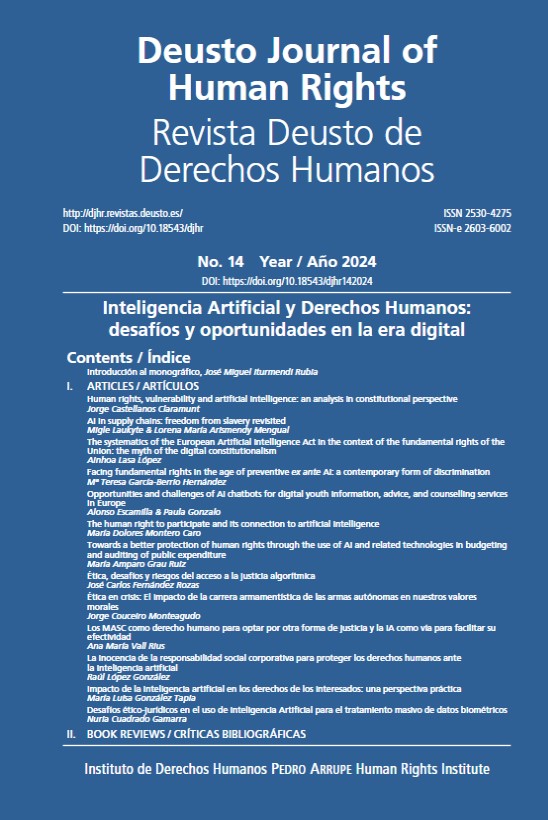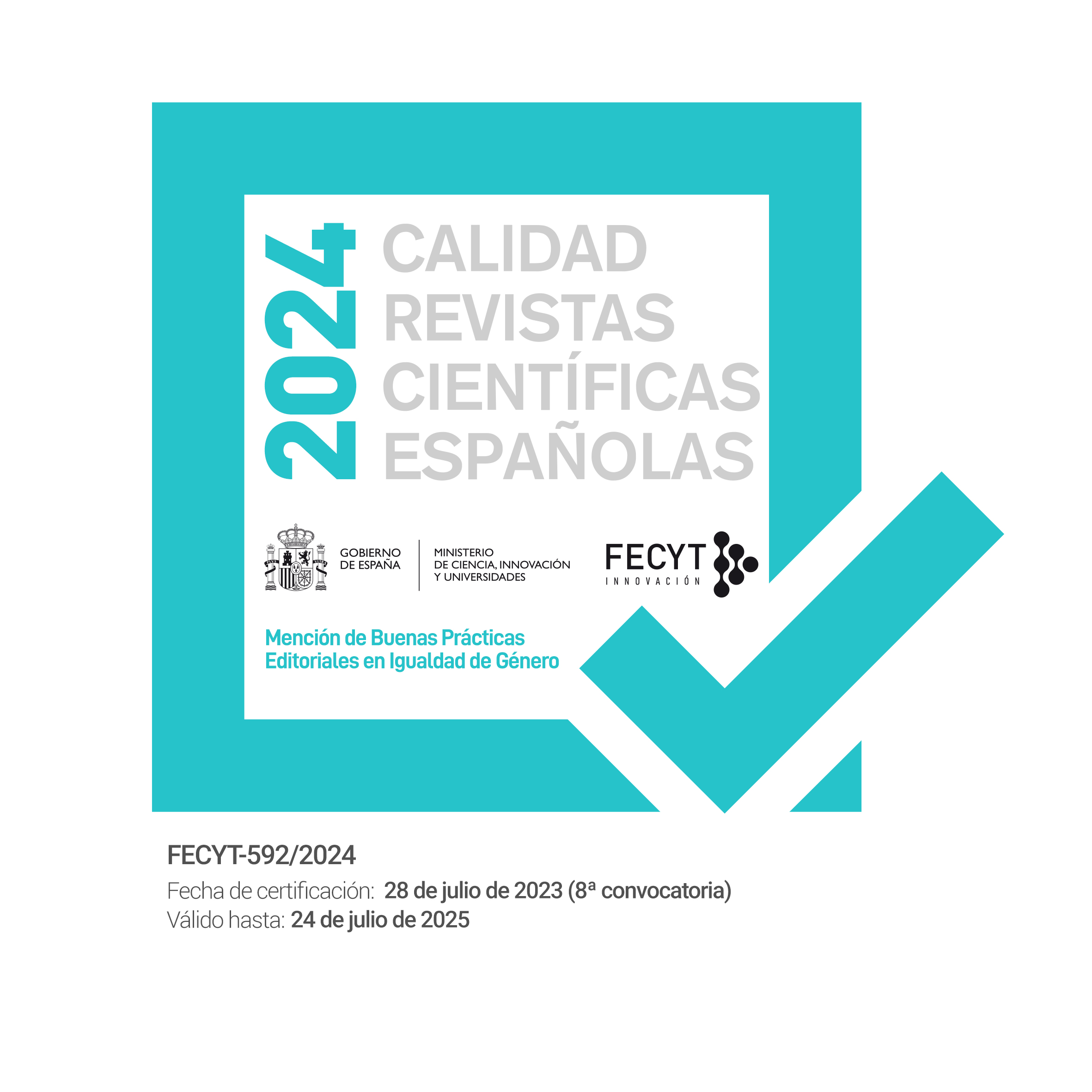Ethics, challenges and risks in access to algorithmic justice
Abstract
Socially, AI raises concerns about the privacy of conflicting parties, as well as questions about the transparency, accuracy and reliability of algorithms used in judicial processes. The aim of this article is to examine AI developments and their impact on human rights from social and legal perspectives, providing elements to address the eventual challenges of the increased use of its different applications. Starting from its immense possibilities it is argued that such AI applications can help society but drawing attention to the different legal issues and the associated complexity derived in the legal profession, analysing their advantages, risks, and future professional perspectives. A change in professional tasks is anticipated, where repetitive activities will be less valued, while consultancy and legal advice will become more important, requiring technical-legal knowledge adapted to technological development. In terms of professional ethics, legal operators must understand the capabilities and risks of AI, bearing in mind that current ethical rules must be updated to address its particularities.
Received: 19 May 2024
Accepted: 08 August 2024
Downloads
References
Añón, María José. 2018. «El derecho de acceso como garantía de justicia: perspectivas y alcance», Acceso a la justicia y garantía de los derechos en tiempos de crisis: de los procedimientos tradicionales a los mecanismos alternativos, coordinado por Cristina García–Pascual, 19-75. Valencia: Tirant lo Blanch.
Ashley, Kevin D. 2017. Artificial Intelligence and Legal Analytics. New Tools for Law Practice in the Digital Age, Cambridge: Cambridge University Press.
Barona, Silvia. 2021. Justicia algorítmica y neuroderecho. Una mirada multidisciplinar, Valencia: Tirant lo Blanch.
Buiten, Miriam C. n.d. «Towards intelligent regulation of artificial intelligence.» European Journal of Risk Regulation 10 (1): 41–59.
Carrizo, Adán. 2019. «El acceso a la justicia de las personas en condición de vulnerabilidad: un reto pendiente para los derechos humanos», Los Derechos Humanos 70 años después de la Declaración Universal, dirigido por Nieves Sanz, 287-310. Valencia, Tirant lo Blanch.
Castillejo, Raquel. 2022. «Digitalización y/o inteligencia artificial», Inteligencia artificial legal y administración de justicia, dirigido por Sonia Calaza y Mercedes Llorente, 55-90. Cizur Menor: Thomson–Reuters–Aranzadi.
Chatterjee, Payel, Aman Singhania y Yuvraj S. Sharma. 2023. Technology and artificial intelligence: Reengineering arbitration in the new world, International Bar Association. Arbitration Commitee Articles, 20 de diciembre. Acceso el 17 de septiembre de 2024. https://www.ibanet.org/tchnology-and-artificial-intelligence-reengineering-arbitration-in-the-new-world.
Ebers, Martin y Paloma Krõõt. 2023. Artificial intelligence and machine learning powered public service delivery in Estonia: opportunities and legal challenges, Cham: Springer.
Esparza, Iñaki. 2022. «Derecho fundamental a la protección de datos de carácter personal en el ámbito jurisdiccional e inteligencia artificial. en especial la LO 7/2021, de protección de datos personales tratados para fines de prevención, detección, investigación y enjuiciamiento de infracciones penales y de ejecución de sanciones penales», Inteligencia artificial legal y administración de justicia, dirigido por Sonia Calaza y Mercedes Llorente (181–209). Cizur Menor: Thomson–Reuters–Aranzadi.
Fernández Pérez, Ana. 2024. «Tránsito del arbitraje de las tecnologías de la información a la inteligencia artificial en las controversias internacionales», Anuario de Arbitraje 2024, editado por Mª José Menéndez, Cizur Menor: Aranzadi.
Fernández Rozas, José Carlos. 2024. «La ley de inteligencia artificial de la Unión Europea: un modelo para innovaciones radicales, responsables y transparentes basadas en el riesgo», La Ley: Unión Europea 124, abril.
Forrest, Katherine B. 2021. When machines can be judge, jury, and executioner: justice in the age of artificial intelligence, New Jersey: World Scientific.
Gómez Colomer, Juan L. 2022. «Derechos fundamentales, proceso e inteligencia artificial: una reflexión», Inteligencia artificial legal y administración de justicia, dirigido por Sonia Calaza y Mercedes Llorente, 257-287. Cizur Menor: Thomson–Reuters–Aranzadi.
Greenstein, Stanley. 2022. «Preserving the rule of law in the era of artificial intelligence (AI)», Artificial Intelligence and Law 30: 291–323.
Leslie, David, Christopher Burr, Mhairi Aitken, Josh Cowls, Mike Katell y Morgan Briggs. 2021. Artificial intelligence, human rights, democracy, and the rule of law: a primer. Council of Europe, The Alain Turing Institute.
Marrow, Paul B., Mansi Karol y Steven Kuyan. 2020. «Artificial intelligence and arbitration: the computer as an arbitrator - are we there yet?», Dispute Resolution Journal 74 (4): 35–76.
Martín Diz, Fernando. 2021. «Modelos de aplicación de Inteligencia Artificial en justicia: asistencial o predictiva versus decisoria», Justicia algorítmica y Neuroderecho. Una mirada multidisciplinar, dirigido por Sonia Calaza y Mercedes Llorente, 65-85. Cizur Menor: Thomson–Reuters–Aranzadi.
Mercan, Gamze y Zumrut V. Seiçuk. 2024. «Artificial intelligence (AI) activities in legal practices», International Journal of Eurasian Education and Culture 9 (25): 131–144
Nieva, Jordi. 2018. Inteligencia artificial y proceso judicial, Madrid: Marcial Pons.
Ortiz de Zárate, Lucía y Ariana Guevara. 2021. «Inteligencia artificial e igualdad de género. Un análisis comparado entre la UE, Suecia y España», Estudios de Progreso 101, Fundación Alternativas. Acceso el 17 septiembre 2024. https://www.igualdadenlaempresa.es/recursos/estudiosMonografia/docs/Estudio_Inteligencia_artificial_e_igualdad_de_genero_Fundacion_Alternativas.pdf.
Re, Richard M. y Solow–Niedermann, Alicia. 2019. «Developing artificially intelligent justice», Stanford Technology Law Review 22 (2): 242–289.
Sartor, Giovanni. 2020. «Artificial intelligence and human rights: Between law and ethics». Maastricht Journal of European and Comparative Law 27 (6): 705–719.
Schäferling, Stefan. 2023. Governmental Automated Decision–Making and Human Rights: Reconciling Law and Intelligent Systems. Cham: Springer.
Scherer, Maxi. 2019. «Artificial intelligence and legal decision–making: The wide open?», Journal of International Arbitration 36 (5): 539–573.
Završnik, Aleš, 2020. «Criminal justice, artificial intelligence systems, and human rights», ERA Forum: Journal of the Academy of European Law 20 (4): 567–583.
Deusto Journal of Human Rights / Revista Deusto de Derechos Humanos is an Open Access journal; which means that it is free for full and immediate access, reading, search, download, distribution, and reuse in any medium only for non-commercial purposes and in accordance with any applicable copyright legislation, without prior permission from the copyright holder (University of Deusto) or the author; provided the original work and publication source are properly cited (Issue number, year, pages and DOI if applicable) and any changes to the original are clearly indicated. Any other use of its content in any medium or format, now known or developed in the future, requires prior written permission of the copyright holder.



3.jpg)
3.jpg)
3.jpg)
.jpg)








